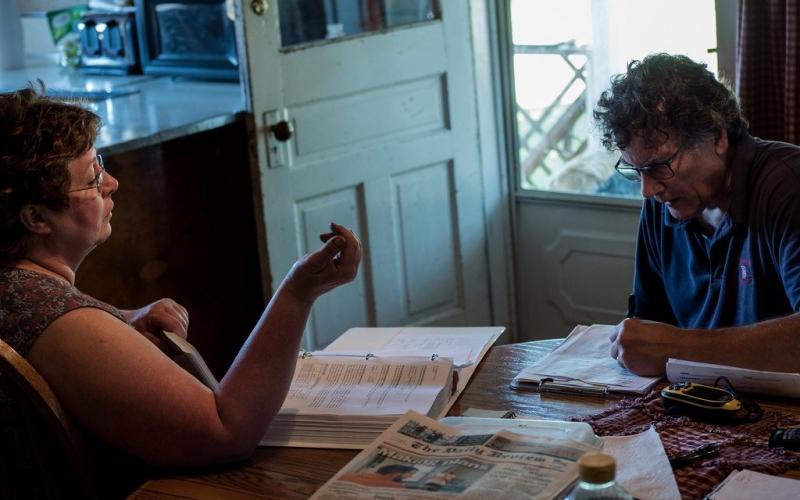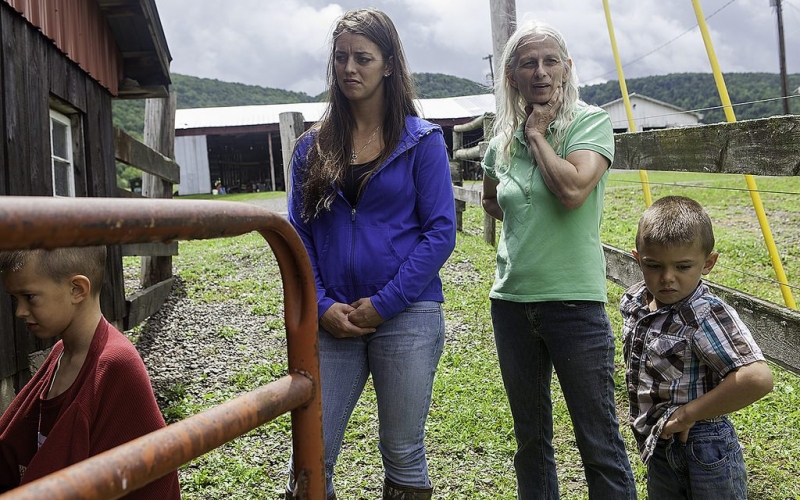Duquesne University Scientist Says State’s Water Testing For Fracking Chemicals Cannot Be Trusted
A Duquesne University professor studying fracking’s impact to drinking water in Pennsylvania says certain water tests used by state officials to detect fracking chemicals cannot be trusted.
The criticism points to the state’s determination letters — conclusions made by the Pennsylvania Department of Environmental Protection (DEP) about whether a person’s water supply has been impacted by oil and gas operations — and instances where ‘trip blanks’ are used to make the determination.
A trip blank is a container that is filled with water and sealed at the laboratory to confirm that no contamination has been picked up during the water testing trip. It’s not reopened until after testing is complete. Essentially, a trip blank should come back to the lab as clean — non-detect. According to information from the Alaska Department of Conservation, if any contaminants are detected in the trip blank sample, “your sample results may not be accurate, and a new test should be run.”
But in an untold number of drinking water complaint investigations by the Pennsylvania DEP, chemicals are being detected in trip blanks, and the Department is not retesting each of those water supplies. Even when those chemicals are associated with fracking.
Public Herald has found several cases across Pennsylvania where contaminated trip blanks have been used for DEP determinations – without retesting.
Dr. John Stolz, the Director of Duquesne University’s Center for Environmental Research and Education, has been testing residential water wells near oil and gas operations for over six years. He also served on DEP’s Laboratory Accreditation Advisory Committee, which addresses quality assurance and control issues in the Department’s water testing procedures.
Stolz says that as far back as 2015 he has told Scott Perry, DEP’s Deputy Secretary in charge of Oil & Gas, that relying on contaminated trip blanks to make conclusions about water quality is inaccurate and misleading.
“I said to Scott Perry that under those circumstances, because obviously something happened, whether it was from cross-contamination or not, they need to go back and resample,” Stolz stated in a recent interview with Public Herald.
In one of the worst examples of a trip blank contamination, a Public Herald investigation in 2014 found that the state detected chemicals associated with fracking – acetone and ethylbenzaldehyde – in a resident’s water supply.
However, DEP dismissed the chemicals as “lab contaminants” and justified their conclusion by explaining that the same chemicals were also found in the trip blank.
According to DEP, the two together — a water sample and trip blank detection — essentially cancelled each other out. That’s what DEP told resident Christine Pepper, who filed the drinking water complaint after water from her faucet stung her face and then disappeared altogether.
In a letter to Ms. Pepper, DEP’s Eastern Oil & Gas Program Manager, Jennifer Means, used a contaminated trip blank to conclude that an oil and gas well pad next door to the Pepper home did not impact the family’s drinking water:
“The detection of acetone and ethylbenzaldehyde in both the trip blank and the water supply sample suggests the presence of these compounds is most likely attributable to the acid that was used to preserve the sample.”
Christine insisted that DEP come back out and retest the water, since the Department found chemicals which are associated with fracking but couldn’t be certain of their origin. But DEP refused, and Means wrote:
“We believe that sufficient data has been gathered to make a determination in this case and do not believe it’s necessary to sample the water supply again.”
Public Herald shared the Pepper complaint case with Professor Stolz, who again referred to what he told DEP Oil & Gas Secretary Scott Perry in June 2015.
“I pointed this out to Perry – if I submit a paper to a peer-reviewed journal using the same conclusions that DEP is using, it would be rejected. In fact, it’s happened to me, and we had to redo the testing, and we fixed it. We re-ran the experiment.”
Stolz continued, “It’s clear something screwed up. As soon as you find something unusual then that set of analysis needs to be thrown out. You can’t just say ‘because we found it in this it’s also in that.’ The trip blank is to ensure that the sample was acquired appropriately. In these [complaint] cases, it was not.”
But the state never retested — so Christine’s family tried to appeal the case to the Environmental Hearing Board. It got so far as a deposition and a hearing date, but the family ultimately decided that the cost of the case was too high ($10,000 on the low-end), and that the system was already set up against them.
Documents for the appeal acquired by Public Herald through Right-to-Know show results from a second, independent water test performed by the nonprofit Water Defense, founded by actor Mark Ruffalo.
The independent test again found acetone in the water supply at levels much higher than in DEP’s test result, and they also found toluene, which was not detected by DEP. Both chemicals are associated with fracking.
Even though the Department received the results from Water Defense showing the same chemicals DEP blamed on lab contamination, no action was taken by the Department to go back out and retest the water.
DEP Policies Fail Across The State
So how big of a problem is this? According to Stolz, “It’s huge! If someone has lost their water, and they’re depending on DEP to make a determination in order to get redress, and the DEP is using questionable policies in order to do that – that’s a problem.”
In Public Herald’s own investigations from 2015 and 2017, improper conduct by DEP officials during drinking water investigations is widespread and systemic.
In fact, failing to retest when chemicals are detected in water supplies is only one example of DEP misconduct. Others include DEP personnel failing to abide by state law and refusing to test people’s water at all.
Or, in other cases, DEP is called out for oil and gas water problems, but never tests the water supply for fracking chemicals or for naturally occurring radioactive materials (NORM) that are heavily concentrated in wastewater (watch video).
DEP has used these testing procedures in over 5,000 complaint cases implicating oil and gas pollution to drinking water.
“They cannot be allowed to use that data [from trip blanks] to make the determination” says Stolz, “ The results were clearly compromised by what was detected and how it was sampled.”
In most cases, says Stolz, if a scientist were to discover that a bottle or another instrument in the lab produced an unwanted result, those devices would be replaced with something else — like a new type of bottle or preservative for collecting samples.
While this is standard procedure for scientists, Stolz says Perry refused to change the Department’s protocol.
“My recollection of the conversation with Scott Perry is he basically said to me that they’re not going to change what they’re doing. He said they’re doing a great job.”
Stolz hadn’t brought this up with Perry on a whim. Perry had provided two determination letters to environmental groups (including Clean Water Action, Earthworks, Sierra Club, Delaware Riverkeeper) that were meeting on a regular basis with Perry’s office. Stolz, the science advisor for the group, noticed that one of the letters made a conclusion with a contaminated trip blank. When Perry refused to acknowledge this problem, Stolz lost his trust in the Department’s ability to accurately test people’s water supplies.
“DEP’s practice or policy in collecting these water samples, in my opinion as a scientist, is invalid.”
We asked Stolz what would happen if one of his students performed a test and made a conclusion like DEP’s.
“I would say the same thing I said to Scott Perry. I would march that student right back in the lab and have them redo it.”









The chemical acetone IS used in the testing process. You purposely don’t mention that because you are selling a narrative at any costs. Considering your educational background in Liberal arts, I bet chemical compounds sound scary. Acetone is used in the testing process and you should inform better.
Considering that Dr. John Stolz has an educational background in microbiology, I assume he knows more about lab procedures than you. The only narrative being sold is by the fracking companies.
My background is in Chemistry, but it sounds to me that you are a participant in this and that you have an axe to grind.
No, I am not a participant and I have no axe to grind. However, as a former graduate student of Dr. Stolz , I know that he represents the very highest standards of what science has to offer. If he says there is a problem with how testing is conducted, there is a problem.
My background is also in chemistry – if your blanks are contaminated, you need to re-run your experiment. Using shortcuts to save time is not acceptable.
His PhD is in Biology. Not hydrology, not Chemistry and not Petroleum Engineering. To suggest that he’s a Tsar on the issue isn’t proper. He’s in the Ecological field. And yes, some of those professors do have an axe to grind.
A lot of chemical parameters sampled during biological studies (ex: macroinvertebrate study) may include the same quality used by other disciplines. Typically, details on how the sample was collected (container, amount of what concentration of acid), filtering, ice temperature (at lab), legal seal numbers at field and are they intact at lab, are part of the documemntation that might be checked.
But I’m not suggesting that he does have an axe. He might. I really don’t know. But I can tell these authors and you have definite biases.
Acetone may also be a laboratory cleaner. Not saying that retesting still should not be considered.
Trip blanks are only one of the types of blank. These are sealed at office prior to sampling. Field blanks are prepared in the field where the sampling occurs. Equipment blanks test the possibility of contamination (like hand filtering equipment) from field sampling. Dupicates (split samples) of state (and possibly other parties) are also part of QA/QC. Not saying all this is done on any particular sampling event, just to clarify not just field blanks.